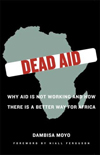
Last week, Dambisa Moyo addressed a packed auditorium at the Cato Institute in Washington, D.C., her latest stop in what the Center for Global Development’s Todd Moss (the discussant for Moyo’s lecture) called Moyo’s “media vortex.” If you have not yet heard of Dambisa Moyo, she is the author of Dead Aid: Why Aid is Not Working and How There is a Better Way For Africa, a book that (as the title suggests) sharply critiques the current foreign aid and development paradigm (Moyo might call it an “industry”) toward Africa.
Paul Collier recently said that Moyo’s ideas “deserve to be taken seriously” and Kofi Annan praised her book as "compelling case for a new approach to Africa.” Other notable aid and development scholars and economists have called her book “sloppy, simplistic, illogical, and stunningly naive.” There have been plenty of both well- and poorly-reasoned reviews, blog posts, even campaigns launched for and against Dead Aid in the Moyo’s ongoing “media vortex,” not to mention numerous interviews and a Colbert Report appearance. I recommend reading some of these sources and actually reading Moyo’s book itself, so I won’t rattle on here.
Something that stuck with me, however, from Moyo’s Cato lecture, was her clear call to anyone who was listening (and everyone in that packed auditorium was indeed hanging on her every word) to stop thinking of “helping” and taking pity on Africa; she said that the Africans that she knows—herself included—are not interested in people “helping” them; they are interested in support, collaboration and equal exchange. In other words, they are interested in being respected instead of being pitied. Then again, as Moyo said in the Q and A at Cato, she cannot speak for all one billion Africans; she is just speaking from her own experiences and as a development economist.
Moyo’s call should certainly be extended to those of us working in the advocacy community. In calling attention to the dire situations on the ground in places like Darfur and eastern Congo, we must strive to represent these realities by listening to the people who know them best: Darfuris and Congolese people who are living in ZamZam camp or in Masisi town. Not those who parachute in with a video camera or a reporter’s notebook. There is nothing wrong with increased attention to pressing issues such as the scourge of sexual violence in eastern Congo; in fact, this attention is necessary in order for political will to be mobilized and serious international action to be taken. But I think Moyo is right in demanding that when any international actor—from celebrities and aid organizations to governments and advocacy groups—chooses to call attention to an issue on the African continent, they do so by soliciting advice and input from the people of this continent.

